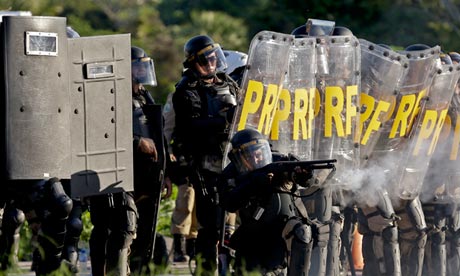Around 5,000 protesters in clashes with police near Castelao stadium in Fortaleza where Spain beat Italy in semi-final tie

Around 5,000 anti-government protesters clashed with police on Thursday near a football stadium that hosted one of the Confederations Cup semi-finals.
The protesters marched peacefully, but clashes broke out as they neared the outer limits of a security zone about a mile from the stadium in Fortaleza, where Spain beat Italy on penalties. In Rio de Janeiro around 2,000 protesters marched without incident.
The marches were the latest in a series of nationwide protests in Brazil that began on 17 June. Sparked by a small rise in bus fares, the protests have spiralled amid anger about corruption and poor public services despite Brazilians' heavy tax burden.
The protesters have also denounced the billions of dollars spent on hosting the World Cup and the 2016 Olympics in Rio, money they say should be going toward better hospitals, schools, transport projects and schools.
Victoria Ferreira, a 16-year-old protesting near the Castelao stadium in Fortaleza, said it was ironic that "if something broke out here, some violence, there would be no hospitals to take care of us".
Authorities fired teargas and rubber bullets in an effort to break up the crowd, and the protesters responded by firing catapults, letting off fireworks and throwing stones. At one point a group of protesters broke through the outer police line and made a dash for the stadium, but they were repelled.
Scattered protests were also reported elsewhere in the country, but they were generally small rallies focused on individual issues. Last week as many as a million people took the streets.
The president, Dilma Rousseff, met union leaders and legislators in Brasilia to discuss the protesters' demands for anti-corruption measures and improved public services.
Rousseff was preparing the ground for a proposal she is expected to deliver to congress on Monday for a referendum on political reform. No details about the substance of the reforms or the timing of the vote have been released.
Rousseff's general secretary, Gilberto Carvalho, told reporters that the biggest lesson the government had learned from the protests was that it needed to listen more carefully to and better understand the protesters' grievances.
"For that reason, the plebiscite, which will allow people to express themselves about political reform, is extremely important," Carvalho said. "To underestimate the unpreparedness of the population would be an error, the same error of those who disregarded their capacity to mobilise in the streets."
culled from Guardian
No comments:
Post a Comment